Weyburn – When the downturn hit, pretty much every oilfield services company quit buying new iron, from trucking companies to drilling rigs to service rigs. As the downturn went on for year after year, a new piece of iron became a rare thing, indeed.
But breaking out of the doldrums is John Kmita Ltd., a Weyburn-based service rig outfit.
Jonathan Kmita said they picked up the new rig in November, a double-triple, meaning it can handle two joints of pipe or three joints of rod at a time.
“I should have pulled the trigger a couple months before I did,” Kmita said. If he had, he would have been able to get a Tier III engine, but this engine is a Tier IV.
“It was one of the only rigs being built in the country, it was two months longer than it was supposed to be. So when we picked it up, they were standing at the door, damned near crying, because it was their only work leaving out the door.”
It was built in Leduc.
“Part of my reasoning was I didn’t have much for debt load. Hopefully we’ll see a little rebound and things will start looking up by the time we have to start paying for it.”
The new rig is Rig 6. Rigs 1 and 2 are retired now. Rig 1 was purchased by his late father, John Kmita, and put to work over 4 decades ago, being rebuilt several times over that time. “It wasn’t the plan, but it seems everyone fell out of love with the singles again,” he said. Thus, the new rig was a double.
Three of the four rigs have been busy. Much of their work is in the Weyburn Unit, with two rigs focused on that area. The third was working near Stoughton.
Asked how the last few years have been going, he said, “We got lucky with having the right customers. Last year, with Rig 1 sitting from the end of May until it did a little work in November, it hurt the pocketbook. Being down 30, 35 per cent on revenue, you’re just keeping your head above water. All it took was for that rig to sit for six months.
“I decided to retire it before it sat. Once it did sit, breakup came and it never did go back out again until November. It worked for a month. We got the new rig in the end of November, and it went to work in February. Now we’re trying to get it back to work.”
If there was work for it, Rig 1 could go back to work. “There’s nothing wrong with it. Just people fell out of love with singles,” he said.
He tried to time the new rig coming out of the downturn while equipment was cheaper. “I paid less for it than Rig 5 in 2013.”
They have enough hands for four rigs, but that could change in a day or two, he noted. “Maybe just enough guys right now.
The total is around 26 people, all in.
John Kmita passed away in March 2015. “It’s a big change. He wasn’t that involved, but he was still involved. He always had his finger on the pulse. In this downturn, you would look to him for advice, and he’s not there to ask anymore. He’d been through several of them.”
Indeed, when Pipeline News wrote the 40th anniversary story of John Kmita Ltd., he told a tale about the kids getting frostbite, looking into an empty fridge.
“I loved that story,” Jonathan said.
Jonathan and his brother Tyler run the company together. Tyler looks after the safety aspect. “Between him and I, we look after the rigs, and the farm, and the cows. And I’ve got all my bucking horses. We’re never short of anything to do.”
How does he find time for all that?
“There’s 24 hours in a day,” he said with a laugh. “Sometimes you use up quite a bit of it.
“That’s the nice thing about having long term employees. They require minimal supervision at times, especially the busy summer months, when you’re between farming, ranching, rigs and rodeo.”
They seed 2,500 to 3,000 acres, and have that again in grass and hayland. There’s just under 200 head of cattle, and 60-70 bucking horses, not including the saddle horses. Those bucking horses supply the pro rodeo circuit in Alberta, British Columbia, Idaho, Oregon and Washington.
When things are slow on the rigs, the guys sometimes find themselves working on the farm/ranch.
“That’s the nice part about working in the Weyburn Unit. In the spring, I find make-work projects on the farm and ranch that gives them a paycheck. You invest in them, and they invest in you, so that when the rig goes back to work, they’re ready to go. It makes it easier to find guys, especially with the downturn, where there’s not a lot of people wanting to make careers in oil and gas right now,” he said.
For the rest of 2019, he said, “It looks like the status quo. That hinges on the price being relatively stable.”
John Kmita Ltd. sent some guys and equipment to the Regina Rally Against the Carbon Tax in early April. “For us, in oil and gas, it’s a bit of a knee-jerk reaction. In Western Canada, we’re always reactive, and have to try to be proactive.”
Kmita thinks if federal policies are going to be the death of the industry, so you better say something before its too late.
He noted Rig 3 was bought in 1985, during the days of the National Energy Program. “The first Trudeau nearly did us in,” he said. “A new rig, and another Trudeau is in government.”




